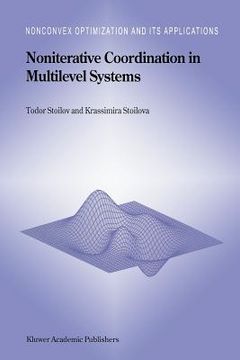Share
noniterative coordination in multilevel systems
Todor Stoilov
(Author)
·
Springer
· Paperback
noniterative coordination in multilevel systems - Stoilov, Todor
Choose the list to add your product or create one New List
✓ Product added successfully to the Wishlist.
Go to My Wishlists
Origin: U.S.A.
(Import costs included in the price)
It will be shipped from our warehouse between
Thursday, May 23 and
Monday, June 10.
You will receive it anywhere in United Kingdom between 1 and 3 business days after shipment.
Synopsis "noniterative coordination in multilevel systems"
Multilevel decision theory arises to resolve the contradiction between increasing requirements towards the process of design, synthesis, control and management of complex systems and the limitation of the power of technical, control, computer and other executive devices, which have to perform actions and to satisfy requirements in real time. This theory rises suggestions how to replace the centralised management of the system by hierarchical co-ordination of sub-processes. All sub-processes have lower dimensions, which support easier management and decision making. But the sub-processes are interconnected and they influence each other. Multilevel systems theory supports two main methodological tools: decomposition and co-ordination. Both have been developed, and implemented in practical applications concerning design, control and management of complex systems. In general, it is always beneficial to find the best or optimal solution in processes of system design, control and management. The real tendency towards the best (optimal) decision requires to present all activities in the form of a definition and then the solution of an appropriate optimization problem. Every optimization process needs the mathematical definition and solution of a well stated optimization problem. These problems belong to two classes: static optimization and dynamic optimization. Static optimization problems are solved applying methods of mathematical programming: conditional and unconditional optimization. Dynamic optimization problems are solved by methods of variation calculus: Euler- Lagrange method; maximum principle; dynamical programming.
- 0% (0)
- 0% (0)
- 0% (0)
- 0% (0)
- 0% (0)
All books in our catalog are Original.
The book is written in English.
The binding of this edition is Paperback.
✓ Producto agregado correctamente al carro, Ir a Pagar.

